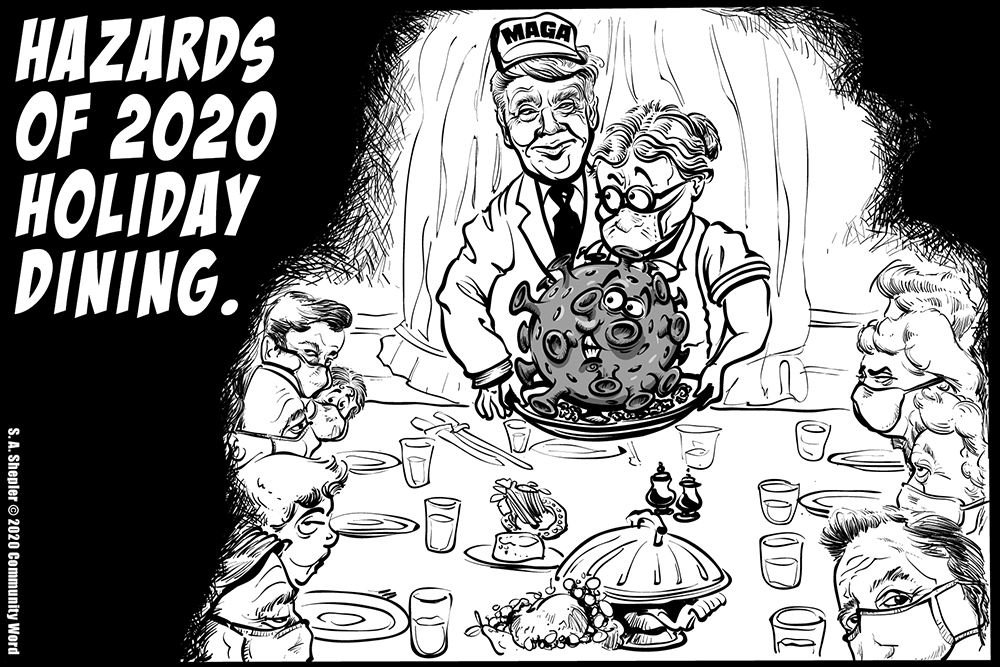
The Journal Star has clearly deteriorated under GateHouse and now Gannett ownership, but a new low was reached Sunday Nov. 15 with a column on page B1 about Gov. JB Pritzker’s order restricting indoor dining in restaurants and bars. The column, written by a Journal Star reporter, stated “The wisdom of that order can be questioned. It isn’t clear at all whether restaurants and bars are a primary source of COVID infections … .”
False. Not only false, but a dangerous assertion that undermines public safety.
Scientists and doctors around the world, the CDC and the Illinois Department of Public Health all support closing indoor dining and imposing a curfew on indoor alcohol consumption.
The Journal Star reporter was second guessing credible science, and he has no science training, no medical training, no public health training.
We know from the playbook, that’s all that’s needed to undermine confidence and sow the seeds of doubt. No scientific facts, no research, no interviews with physicians and scientists.
Disappointing “reporting.” Disappointing “editing.” Disappointing newspaper ownership by Gannett.
The company evidently looks at its local newspapers including the Journal Star as marketing and profit centers, not sources for foundational community journalism.
Gannett owns USA Today and about 250 daily newspapers. According to Editor & Publisher, the company offered another round of buyouts recently, and 600 employees opted in. About 500 were accepted. This eliminates several journalists from the already emaciated newsrooms in Peoria and more from the State Journal-Register in Springfield.
Jon Schleuss, president of The NewsGuild/Communication Workers of America, told Poynter Institute for Media Studies, “Gannett’s furloughs earlier this year and the recent buyouts undermine our democracy. It’s a disgrace that any news company thinks it can cut its way to success.”
But as troubling as the cuts are, the disinformation and doubt sowed on the news pages of the Journal Star is more alarming. It’s life-threatening.
Obama, Trump, COVID-19, Biden: How did this happen?
Isabel Wilkerson’s brilliant book, “Caste: The Origins of Our Discontents,” has been described as rattling, disconcerting, uncomfortable and heartbreaking.
Wilkerson gives us an alarming understanding of American history. She helps answer that befuddling phenomenon of why people vote against their own self-interest.
She helps us understand our nagging worry about why millions of Americans voted for Donald Trump despite seeing four years of hatred, xenophobia, racism, misogyny, greed and ignorance.
Wilkerson writes that Barack Obama was not the start of a post-racial society. While he won the election, the majority of white Americans did not vote for him, they voted for a caste system that keeps some people in a dominant caste, some in a subservient caste. They were voting for a caste system that has always worked for their own interest and “some were willing to accept short-term discomfort, forgo health insurance, risk contamination of the water and air, and even die to protect their long-term interest in the hierarchy as they had known it.”
Sounds remarkably like “Make America Great Again.”
Despite the clear science about COVID-19, some people make fun of mask wearing, protest and violate containment measures and risk contracting and transmitting the virus. They are standing by their allegiance to their tribe, to their leader who vows to maintain the old caste system.
Wilkerson writes the caste system in America is similar to India’s treatment of untouchables and Nazi Germany’s treatment of Jews.
She cites this statement by philosopher David Livingston Smith:
“It is all too easy to imagine that the Third Reich was a bizarre aberration. It’s tempting to imagine that the Germans were (or are) a uniquely cruel and bloodthirsty people. But these diagnoses are dangerously wrong. What’s most disturbing about the Nazi phenomenon is not that the Nazis were madmen or monsters. It’s that they were ordinary human beings.”
Wilkerson is telling us that it’s on our watch the caste system of discrimination and racism continues, that brown-skinned children are put in cages at our border, that Muslim bans are somehow justified, that U.S. aid is denied to international agencies that provide reproductive choice to women, that regressive taxation can continue and hurt the lowest earners, that public schools in some communities can be inferior to those in other communities.
“As we go about our daily lives, caste is the wordless usher in a darkened theater, flashlight cast down in the aisles, guiding us to our assigned seats for a performance,” she writes. Caste “is about respect, authority and assumptions of competence – who is accorded these and who is not.”
The New York Times book critic, Dwight Garner, wrote, “It’s a book that changes the weather inside a reader.”
Wilkerson not only shows us the reality of the American caste system, she shows us a way out, suggesting we need something akin to South Africa’s Truth and Reconciliation Commission:
“Our era calls for a public accounting of what caste has cost us, a Truth and Reconciliation Commission, so that every American can know the full history of our country, wrenching though it may be. The persistence of caste and race hostility, and the defensiveness about anti-black sentiment in particular, make it literally unspeakable to many in the dominant caste. You cannot solve anything that you do not admit exists, which could be why some people may not want to talk about it: it might get solved.”
“The price of privilege is the moral duty to act when one sees another person treated unfairly.”
Ending the caste system will not come with one election or one law. It can come from deep understanding of systemic racism, and that does not come from one book or one lecture. It evolves over time with constant work and effort to improve the lives of every human being and to redress environment degradation that harms the most vulnerable first but then spreads to people in all socioeconomic levels, no matter how privileged they may feel.
